Shoretel 930D Users Manual ManualsLib Makes It Easy To Find Manuals Online!
2014-12-11
: Shoretel Shoretel-930D-Users-Manual-121374 shoretel-930d-users-manual-121374 shoretel pdf
Open the PDF directly: View PDF ![]() .
.
Page Count: 24

ShoreTel IP Phone 930D
Base Station and Repeater
User Guide
May 2013

Legal Notices
2 Base Station and Repeater User Guide ShoreTel IP Phone 930D
Document and Software Copyrights
Copyright © 1998-2013 by ShoreTel Inc., Sunnyvale, California, USA. All rights reserved.
Printed in the United States of America. Contents of this publication may not be reproduced or transmitted in any form or by
any means, electronic or mechanical, for any purpose, without prior written authorization of ShoreTel, Inc. ShoreTel, Inc.
reserves the right to make changes without notice to the specifications and materials contained herein and shall not be
responsible for any damage (including consequential) caused by reliance on the materials presented, including, but not limited
to typographical, arithmetic or listing errors.
Trademarks and Patents
ShoreTel, ShoreTel (and logo), ControlPoint, Brilliantly Simple, Brilliantly Simple Communication, ShoreCare, ShoreGear,
ShorePhone, and ShoreWare are registered trademarks of ShoreTel, Inc. in the United States and/or other countries. The
ShoreTel logo is a trademark of ShoreTel, Inc. in the United States and/or other countries.
All other copyrights and trademarks herein are the property of their respective owners.
The ShoreTel Mobility solution is covered by patents as listed at http://www.shoretel.com/about/patents.html.
Version Information
ShoreTel IP Phone 930D Base Station and Repeater User Guide
Part Number: 800-1806-01
Date: May 2013
Company Information
ShoreTel, Inc.
960 Stewart Drive
Sunnyvale, California 94085 USA
+1.408.331.3300
+1.408.331.3333 (fax)
www.shoretel.com

ShoreTel IP Phone 930D Base Station and Repeater User Guide 3
Before You Start . . . . . . . . . . . . . . . . . . . . . . . . . . . . . . . . . . . . . . . . . . . . . . . . . . . . . . . . . . . .5
About This Book . . . . . . . . . . . . . . . . . . . . . . . . . . . . . . . . . . . . . . . . . . . . . . . . . . . . . . . . . . . . . 5
Organization . . . . . . . . . . . . . . . . . . . . . . . . . . . . . . . . . . . . . . . . . . . . . . . . . . . . . . . . . . . . 5
Conventions . . . . . . . . . . . . . . . . . . . . . . . . . . . . . . . . . . . . . . . . . . . . . . . . . . . . . . . . . . . . 5
Related Documents . . . . . . . . . . . . . . . . . . . . . . . . . . . . . . . . . . . . . . . . . . . . . . . . . . . . . . . . . . 6
Chapter 1 Using the Base Unit . . . . . . . . . . . . . . . . . . . . . . . . . . . . . . . . . . . . . . . . . . . . .7
Unpacking the Box . . . . . . . . . . . . . . . . . . . . . . . . . . . . . . . . . . . . . . . . . . . . . . . . . . . . . . . . . . . 7
Base Overview . . . . . . . . . . . . . . . . . . . . . . . . . . . . . . . . . . . . . . . . . . . . . . . . . . . . . . . . . . . . . . 8
Front View . . . . . . . . . . . . . . . . . . . . . . . . . . . . . . . . . . . . . . . . . . . . . . . . . . . . . . . . . . . . . . 8
Rear View . . . . . . . . . . . . . . . . . . . . . . . . . . . . . . . . . . . . . . . . . . . . . . . . . . . . . . . . . . . . . . 9
Understanding Base Basics . . . . . . . . . . . . . . . . . . . . . . . . . . . . . . . . . . . . . . . . . . . . . . . . . . . . 9
Readying the Base for Use . . . . . . . . . . . . . . . . . . . . . . . . . . . . . . . . . . . . . . . . . . . . . . . . . . . 10
Installing the Base . . . . . . . . . . . . . . . . . . . . . . . . . . . . . . . . . . . . . . . . . . . . . . . . . . . . . . . . . . 11
Resetting the Base to Factory Defaults . . . . . . . . . . . . . . . . . . . . . . . . . . . . . . . . . . . . . . . . . . 12
Monitoring a Base with the LED Indicator . . . . . . . . . . . . . . . . . . . . . . . . . . . . . . . . . . . . . . . . 12
Chapter 2 Using the Repeater Unit . . . . . . . . . . . . . . . . . . . . . . . . . . . . . . . . . . . . . . . . .13
Unpacking the Box . . . . . . . . . . . . . . . . . . . . . . . . . . . . . . . . . . . . . . . . . . . . . . . . . . . . . . . . . . 14
Repeater Overview . . . . . . . . . . . . . . . . . . . . . . . . . . . . . . . . . . . . . . . . . . . . . . . . . . . . . . . . . 14
Front View . . . . . . . . . . . . . . . . . . . . . . . . . . . . . . . . . . . . . . . . . . . . . . . . . . . . . . . . . . . . . 14
Rear View . . . . . . . . . . . . . . . . . . . . . . . . . . . . . . . . . . . . . . . . . . . . . . . . . . . . . . . . . . . . . 15
Repeater Basics . . . . . . . . . . . . . . . . . . . . . . . . . . . . . . . . . . . . . . . . . . . . . . . . . . . . . . . . . . . . 15
Powering the Repeater . . . . . . . . . . . . . . . . . . . . . . . . . . . . . . . . . . . . . . . . . . . . . . . . . . . . . . 16
Connecting the AC Adapter . . . . . . . . . . . . . . . . . . . . . . . . . . . . . . . . . . . . . . . . . . . . . . . . 16
Using a PoE Wire Adapter to Power the Repeater . . . . . . . . . . . . . . . . . . . . . . . . . . . . . . 17
Registering a Repeater to a Base . . . . . . . . . . . . . . . . . . . . . . . . . . . . . . . . . . . . . . . . . . . . . . 18
Installing the Repeater . . . . . . . . . . . . . . . . . . . . . . . . . . . . . . . . . . . . . . . . . . . . . . . . . . . . . . . 18
Restoring a Repeater to Factory Defaults . . . . . . . . . . . . . . . . . . . . . . . . . . . . . . . . . . . . . . . . 19
Monitoring a Repeater with the LED Indicator . . . . . . . . . . . . . . . . . . . . . . . . . . . . . . . . . . . . . 19
Chapter 3 Troubleshooting . . . . . . . . . . . . . . . . . . . . . . . . . . . . . . . . . . . . . . . . . . . . . . .21
Troubleshooting for the Base Station . . . . . . . . . . . . . . . . . . . . . . . . . . . . . . . . . . . . . . . . . . . . 21
Troubleshooting for the Repeater . . . . . . . . . . . . . . . . . . . . . . . . . . . . . . . . . . . . . . . . . . . . . . 22
Accessing Site Survey Mode . . . . . . . . . . . . . . . . . . . . . . . . . . . . . . . . . . . . . . . . . . . . . . . 24
Contents

Table of Contents
4 Base Station and Repeater User Guide ShoreTel IP Phone 930D

ShoreTel IP Phone 930D Base Station and Repeater User Guide 5
Before You Start
This preface contains the following topics:
About This Book on page 5
Related Documents on page 6
About This Book
This book is intended for those who install, administer, or use the ShoreTel IP Phone 930D. It
describes the features of the base station unit and the repeater unit. This document should be used in
conjunction with the ShoreTel IP Phone 930D Planning and Installation Guide.
Organization
This document is divided into the following chapters:
Chapter 1, Using the Base Unit on page 7, describes how to install and use the base station.
Chapter 2, Using the Repeater Unit on page 13, describes how to install and use the repeater.
Chapter 3, Troubleshooting on page 21, describes how to troubleshoot issues with the
components.
Conventions
The following typographical marking conventions are used in this document.
Marking Meaning
Bold Names of interface objects, such as buttons and menus.
Blue Cross references with hyperlinks. Click the blue text to go to the indicated
section. All chapters have a list of section links on the first page.
Note: Table of Contents entries are also links, but they are not shown in blue.

6 Base Station and Repeater User Guide ShoreTel IP Phone 930D
Before You Start Related Documents
Related Documents
The following documents are also available:
ShoreTel IP Phone 930D Planning and Installation Guide
ShoreTel IP Phone 930D Handset User Guide

CHAPTER
ShoreTel IP Phone 930D Base Station and Repeater User Guide 7
1.
Using the Base Unit
This chapter describes how to set up and use the IP930D base unit and contains these main topics:
Unpacking the Box on page 7
Base Overview on page 8
Understanding Base Basics on page 9
Readying the Base for Use on page 10
Installing the Base on page 11
Resetting the Base to Factory Defaults on page 12
Monitoring a Base with the LED Indicator on page 12
Unpacking the Box
Make sure that all of these items are included in the base unit package:
1 x IP930D base
1 x base charging stand
1 x printed Safety, Warranty, and Regulatory Information sheet
2 x wall mounting screws and anchors

8 Base Station and Repeater User Guide ShoreTel IP Phone 930D
Using the Base Unit Base Overview
1
Base Overview
The illustrations below show the front view and back view of the IP930D base.
Front View

Using the Base Unit Rear View
1
ShoreTel IP Phone 930D Base Station and Repeater User Guide 9
Rear View
Understanding Base Basics
Bases are the gateway between the IP network and IP930D handsets.
Bases are powered by a Power-over-Ethernet (PoE) connection.
Bases can be used in stand-alone- or multicell-mode.
If more than four handsets are needed in a system, the multicell mode is required to synchronize
bases and maximize performance.
Each base can support up to four IP930D handsets.
Bases come in two versions: A version for North America, and a second for Europe, Australia, and
New Zealand.
The IP930D handset detects the frequencies used by the base and adapts automatically.
For more information, see the ShoreTel IP Phone 930D Planning and Installation Guide.
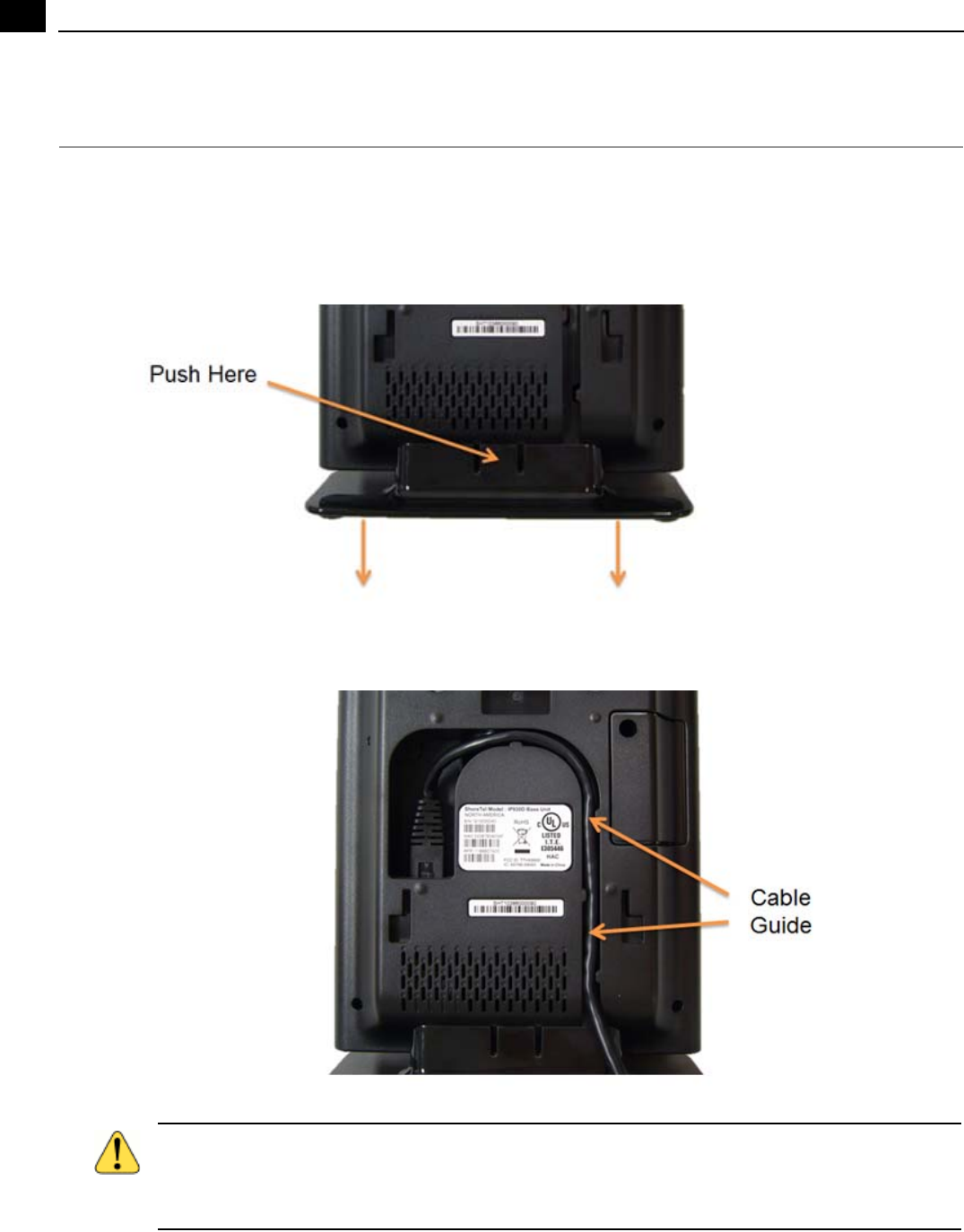
10 Base Station and Repeater User Guide ShoreTel IP Phone 930D
Using the Base Unit Readying the Base for Use
1
Readying the Base for Use
1. Prepare the configuration files for the base and upload them to the FTP server. See the ShoreTel
IP Phone 930D Planning and Installation Guide for instructions on how to prepare these files.
2. If the base will be wall mounted, remove the base stand from the bottom of the base by pressing
the area shown and pulling downward.
3. Plug the Ethernet cable downward into the jack and route the cable through the cable guide so the
cable exits near the bottom of the base.
WARNING!
Do not unplug the Ethernet cable until the LED indicator stops fast flashing red (500 mS on/500
mS off); unplugging the cable while the LED indicator is fast flashing red can permanently
damage the base.
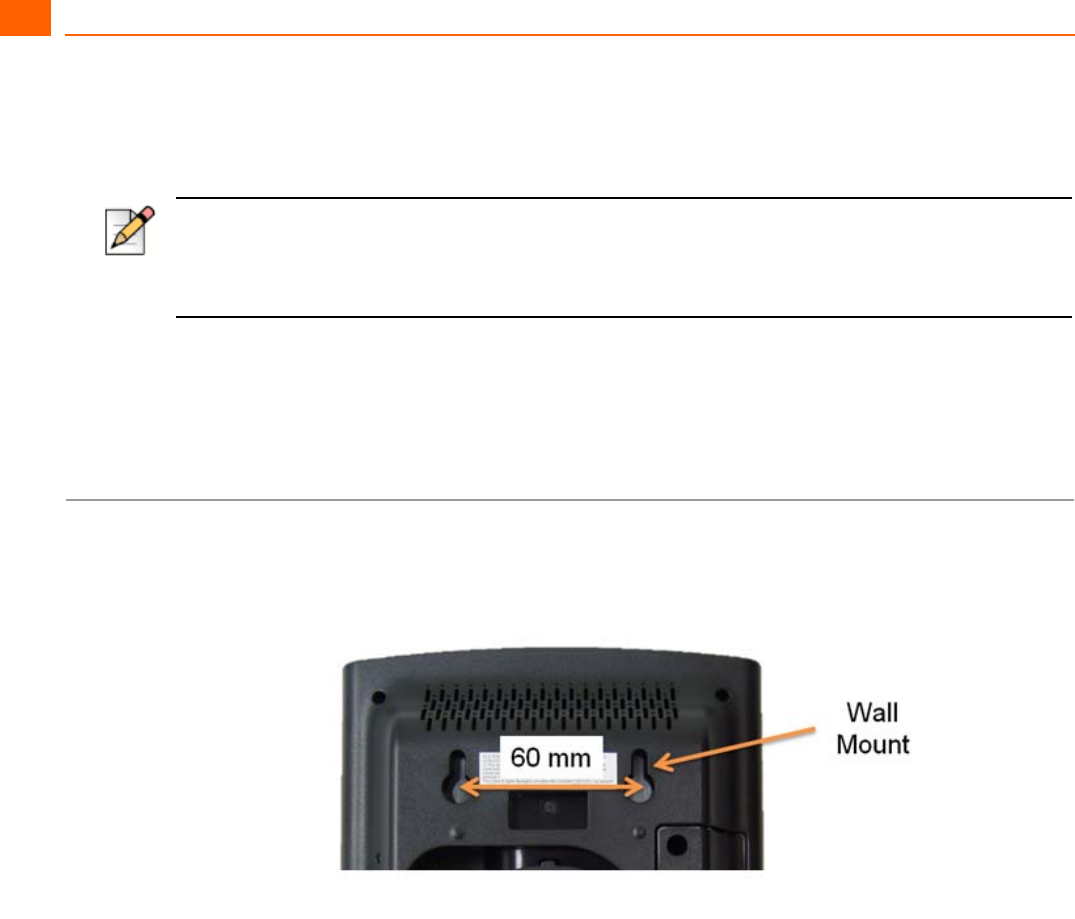
Using the Base Unit Installing the Base
1
ShoreTel IP Phone 930D Base Station and Repeater User Guide 11
When the Ethernet cable is attached, the base powers up and downloads configuration files from the
specified FTP server, after which the base can be managed using ShoreTel IP930D Manager.
The first time the base is plugged in, the process can take up to 10 minutes. The base LED indicator
will stop flashing red or green when the process is complete.
Installing the Base
To mount the base on a wall, use the provided screws, or use bolts with a 6-10 mm head and a shaft
that is less than 4 mm in diameter. Install screws or bolts with centers separated by 60 mm.
Here are some guidelines for installing bases:
Bases should be mounted as high on a wall as possible and away from large metal objects or
building structures that can block their signal.
Do not mount bases near electrical appliances such as microwave ovens or other radio frequency
sensitive or generating equipment such as computers.
Bases must be mounted with at least one meter of separation between devices.
All bases must all be installed on the same subnet.
For more guidance on where to locate bases when installing your system, see the ShoreTel IP Phone
930D Planning and Installation Guide.
Note
Option 156 must be enabled and the ftpserver parameter set so that the base can locate and load the
required configuration files. Refer to the ShoreTel IP Phone 930D Planning and Installation Guide for
more information.
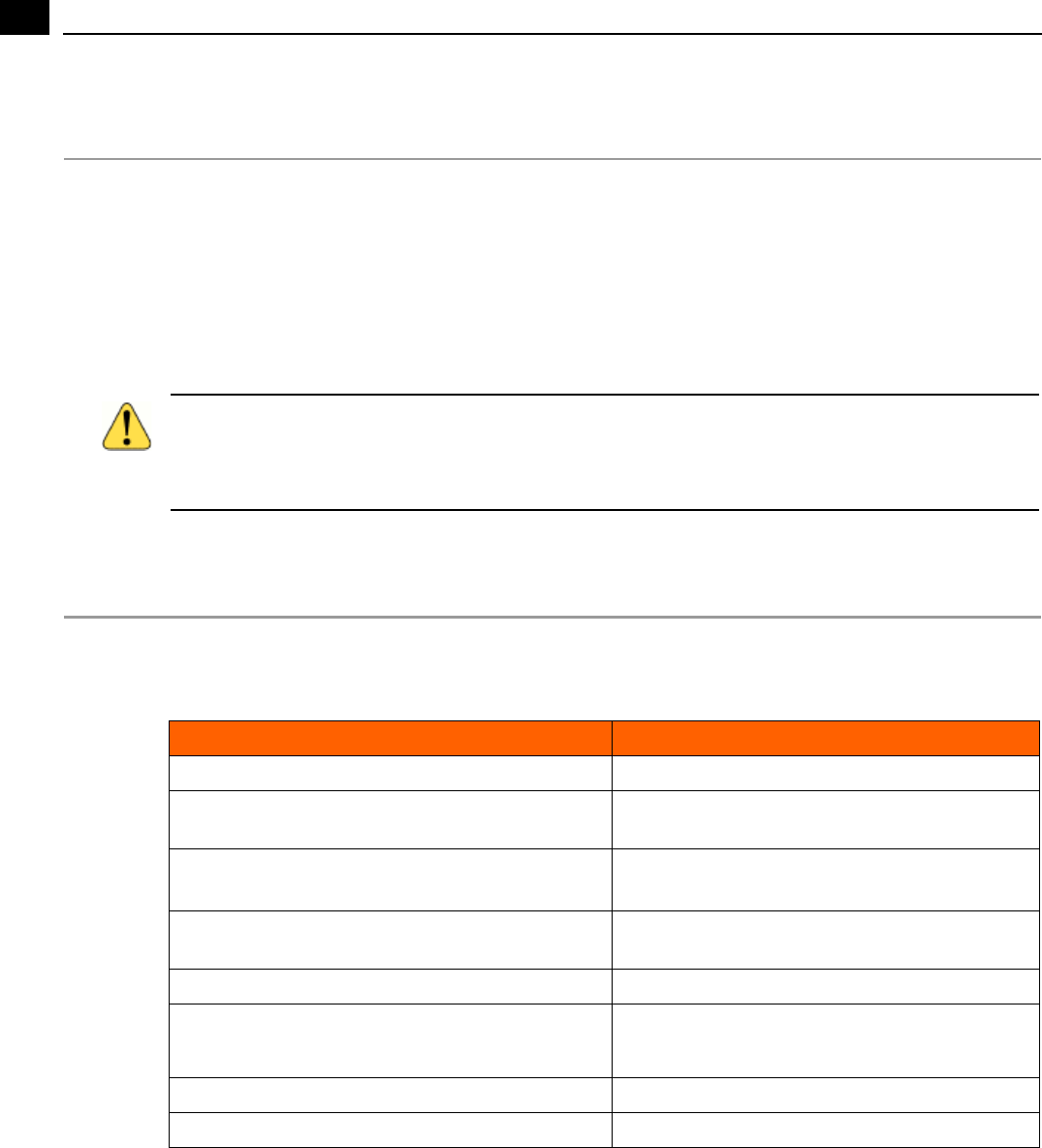
12 Base Station and Repeater User Guide ShoreTel IP Phone 930D
Using the Base Unit Resetting the Base to Factory Defaults
1
Resetting the Base to Factory Defaults
To return a base to its factory defaults, follow this procedure:
1. Plug in the base and wait until the LED indicator starts flashing green.
2. Press and then hold the reset button on the back of the base for at least 10 seconds, or until the
LED indicator turns off.
The base restarts using its factory defaults.
Monitoring a Base with the LED Indicator
The base has an LED indicator on the front that can be used to monitor the base’s status. Additional
information on the base status is available using ShoreTel IP930D Manager.
WARNING!
Never unplug a base or perform any type of reset on a base whose LED indicator is fast
flashing red (500 mS on/500 mS off); doing so can permanently damage the base. A fast red
flash means that firmware in the unit is being upgraded.
LED State Description
Off No power.
Two red flashes followed by flashing green (1 sec
on/1 sec off)
Base is starting.
Winking green (800 mS on/200 mS off) Basehasstartedrunningbuthasnotyet
synchronizedtoamaster(multicellonly).
Solid green Unit is operating normally and is synchronized
to a master.
Winking red (800 mS on/200 mS off) No Ethernet.
Fast flashing red (500 mS on/500 mS off) Unit is upgrading firmware.
(Do not remove power.)
Flashing red/green (1 S red/1 S green) Registration enabled.
Solid red Critical error.

CHAPTER
ShoreTel IP Phone 930D Base Station and Repeater User Guide 13
2.
Using the Repeater Unit
This chapter describes how to set up and use the IP930D repeater unit and contains these main
topics:
Unpacking the Box on page 14
Repeater Overview on page 14
Repeater Basics on page 15
Powering the Repeater on page 16
Registering a Repeater to a Base on page 18
Installing the Repeater on page 18
Restoring a Repeater to Factory Defaults on page 19
Monitoring a Repeater with the LED Indicator on page 19
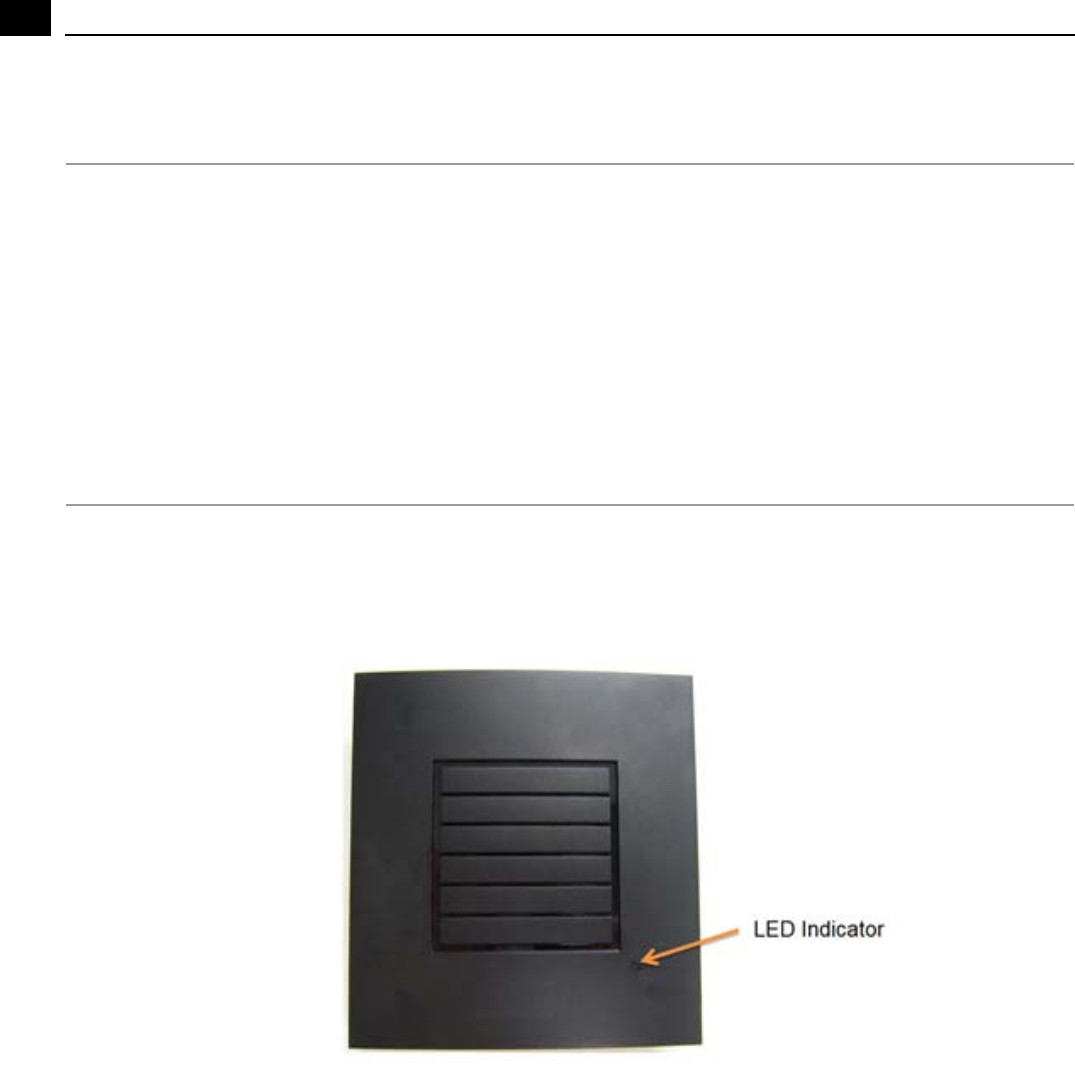
14 Base Station and Repeater User Guide ShoreTel IP Phone 930D
Using the Repeater Unit Unpacking the Box
2
Unpacking the Box
Make sure that all of these items are included in your repeater package:
1 x IP930D repeater
1 x AC adapter with plug adapters
1 x printed Safety, Warranty, and Regulatory Information sheet
1 x wall mounting screw and anchor
Repeater Overview
The illustrations below show the front view and back view of the IP930D repeater.
Front View
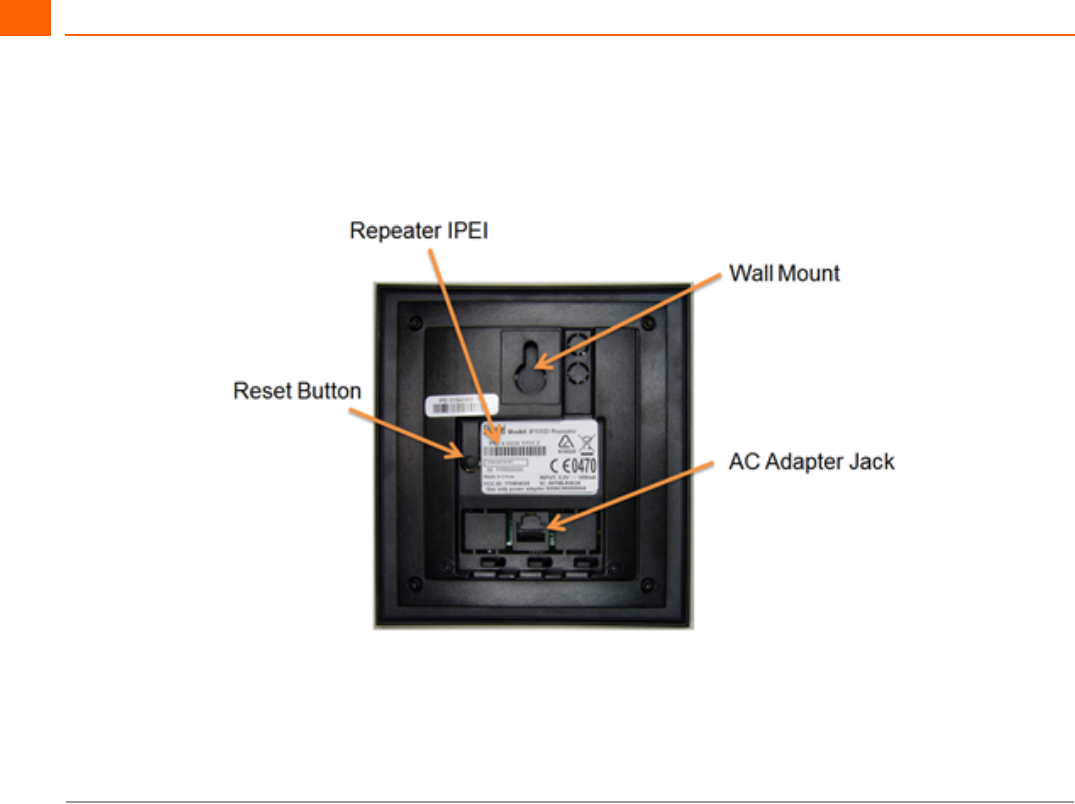
Using the Repeater Unit Rear View
2
ShoreTel IP Phone 930D Base Station and Repeater User Guide 15
Rear View
Repeater Basics
Repeaters are used to extend the operating range of IP930D handsets beyond the coverage area of
the base station. To deliver optimal service, IP930D handsets will automatically connect to the base or
repeater with the strongest signal.
Before the repeater is installed, it must be registered to a base station.
Up to four repeaters can be registered to a base station.
Up to three repeaters can be daisy chained to provide coverage (but doing so may introduce
delays and Y-branches are not supported).
Repeaters can be used to extend coverage in all directions, including vertically (to cover several
floors in a building).
If repeaters are positioned correctly, the mobile handset will automatically switch from cell to cell
with no noticeable interruption. Correct positioning means overlapping the coverage area of the
base station or other repeaters.

16 Base Station and Repeater User Guide ShoreTel IP Phone 930D
Using the Repeater Unit Powering the Repeater
2
Powering the Repeater
Repeaters require one of these for power:
A non-switched AC outlet (100-240V 50/60hz) within 2 meters of the repeater.
A PoE wire adapter and Linksys POES5 5-volt PoE splitter for use with a powered Ethernet
connection.
Connecting the AC Adapter
Follow these steps:
1. Choose the AC power plug that matches the AC outlet in your country or region.
2. Insert the AC power plug into the AC adapter; slide until it locks in place.
3. Plug the AC adapter cable into the modular adapter jack on the rear of the repeater.
If the location where you would like to install in the repeater does not have a nearby AC outlet, use a
PoE wire adapter instead of AC power. See Using a PoE Wire Adapter to Power the Repeater on page
17.
WARNING!
Do not use extension cables to lengthen the AC adapter cable; doing so can cause the repeater to
malfunction.

Using the Repeater Unit Using a PoE Wire Adapter to Power the Repeater
2
ShoreTel IP Phone 930D Base Station and Repeater User Guide 17
Using a PoE Wire Adapter to Power the Repeater
If you need to position the repeater in a location that does not provide a nearby AC outlet, you can use
a PoE wire adapter and a Linksys POES5 5-volt PoE splitter with a powered Ethernet connection to
power the repeater. Use the Linksys splitter to provide power only; do not use the Ethernet cable
provided by the splitter. See the illustration below.
PoE wire adapter
Repeater
Splitter Ethernet
cable (do not use)
Linksys splitter
Powered Ethernet cable plugs in here

18 Base Station and Repeater User Guide ShoreTel IP Phone 930D
Using the Repeater Unit Registering a Repeater to a Base
2
Registering a Repeater to a Base
Refer to the ShoreTel IP Phone 930D Planning and Installation Guide for additional information.
1. Configure the bases in your system to permit repeaters to register, and to assign synchronization
relationships for each repeater.
2. From the Base Security page in ShoreTel IP930D Manager, enable registration on the base with
which you would like to register. Enable registration on only one base at a time; otherwise, the
repeater may attempt to register with the wrong base and delay the registration process.
3. Provide power to the repeater by using AC power, or use a PoE wire adapter and splitter (see
Using a PoE Wire Adapter to Power the Repeater on page 17). Power the repeater in a location
that is near to the base to ensure a good signal.
4. Check that the LED indicator on the front of the repeater begins double-flashing green. If this is not
the case, press and hold the reset button on the back of the repeater until the LED indicator turns
red and then release the button. The LED indicator begins double-flashing green.
5. Within one minute, the LED indicator turns steady green, indicating that the repeater has
registered with the base.
Repeat the above process for all of the repeaters you wish to register with this base. Be sure to
disable registration from ShoreTel IP930D Manager before proceeding to the next base.
Installing the Repeater
Here are some guidelines for installing repeaters:
Repeaters should be mounted as high on a wall as possible and away from large metal objects or
building structures that can block their signal.
Repeaters must be located within six feet of an AC outlet; otherwise, use a PoE wire adapter and
splitter for power. See Using a PoE Wire Adapter to Power the Repeater on page 17.
Repeaters must be located close enough to the base or repeater to which they are synchronized
to provide a signal level between about -65 and -75 dBm. (A value of -70 dBm or better is
recommended).
Do not mount repeaters near electrical appliances or other radio frequency generating equipment,
such as microwaves or computers.
Repeaters must be mounted with at least one meter of separation between devices.
Do not use an AC outlet that can be switched off.

Using the Repeater Unit Restoring a Repeater to Factory Defaults
2
ShoreTel IP Phone 930D Base Station and Repeater User Guide 19
Do not use a cable extender to lengthen the AC adapter’s cable; doing so may cause the repeater
to malfunction.
A single screw or bolt (provided) with a 6-10 mm head and a shaft that is less than 4 mm in
diameter can be used to mount the unit on the wall.
For information more information, see the ShoreTel IP Phone 930D Planning and Installation Guide.
Restoring a Repeater to Factory Defaults
While the repeater is powered, press and hold the reset button on the back of the unit for 3 seconds or
until the repeater’s LED indicator turns red.
The repeater restarts in a factory default state.
Monitoring a Repeater with the LED Indicator
The repeater has an LED indicator on the front that can be used to monitor the repeater’s
performance. Additional information on the repeater status is available using ShoreTel IP930D
Manager.
LED State Description
Off No power.
Slow flashing green (400 mS on/250 mS
off)
Searching for fixed part (base or repeater).
Double flashing green (900 mS on/200 mS
off/200 mS on/200 mS off repeated)
Searching for fixed part in registration mode or
performing registration procedures.
Steady green (occasional red flashes) Repeater is synchronized to its master and operating
properly. Red flashes indicate traffic is passing through
the repeater.
Alternating red/green flashing (200 mS red/
200 mS green)
Repeater is in recovery mode and cannot find base or
RPN allocation error.
Steady red Critical error.

20 Base Station and Repeater User Guide ShoreTel IP Phone 930D
Using the Repeater Unit Monitoring a Repeater with the LED Indicator
2
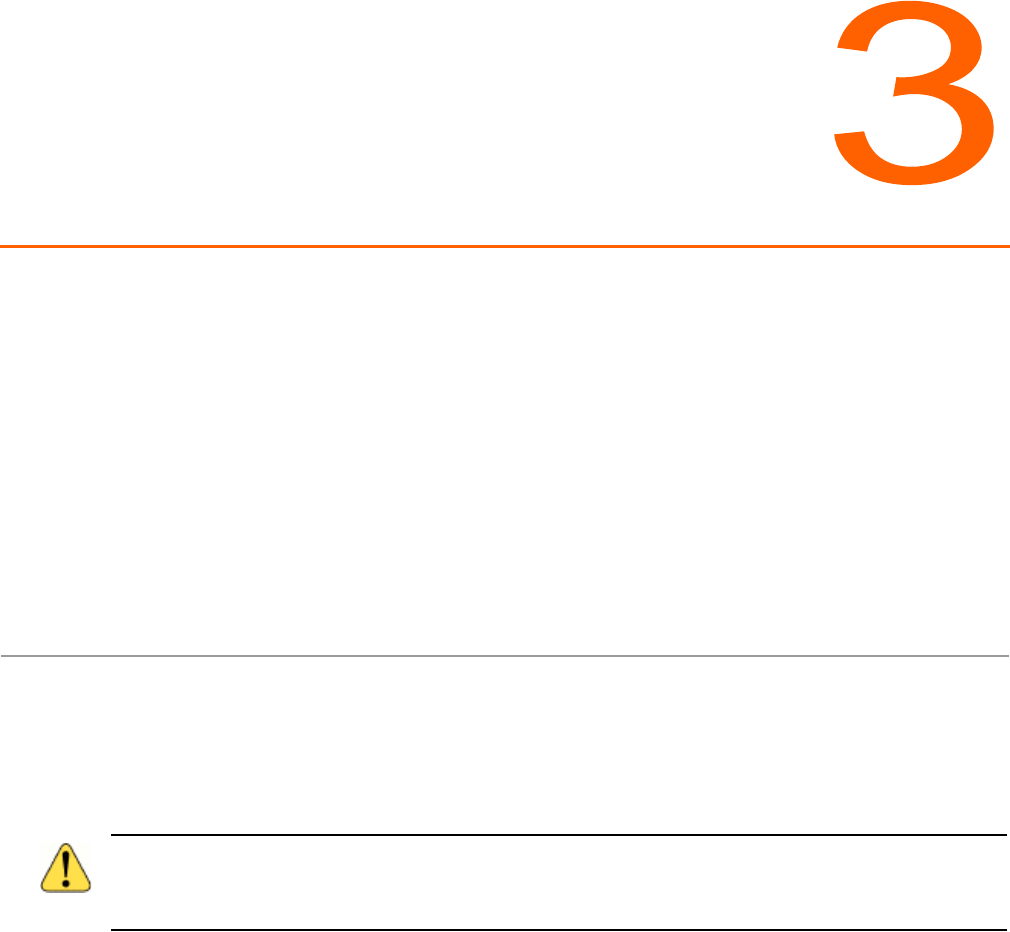
CHAPTER
ShoreTel IP Phone 930D Base Station and Repeater User Guide 21
3.
Troubleshooting
This chapter contains the following topics:
Troubleshooting for the Base Station on page 21
Troubleshooting for the Repeater on page 22
Troubleshooting for the Base Station
Problem: The LED indicator on the base is fast flashing red (500 mS on/500 mS off) and does not
show steady green after the Ethernet cable is plugged in.
Solution: The LED indicator on the base fast flashes red during firmware upgrades, which may occur
when the base is first powered on. The upgrade can take up to 10 minutes to complete.
Problem: The LED indicator on the base is flashing green (1 second on/1 second off) and does not
show steady green after the Ethernet cable is plugged in.
Solution: The base is unable to obtain an IP address from a DHCP server. Check that a DHCP server
is available by plugging a laptop or other device into the Ethernet cable.
Problem: The LED indicator on the base is winking green (800 mS on/200 mS off) and never becomes
steady green.
WARNING!
Never unplug a base while the LED indicator is fast flashing red or the base may be
permanently damaged.

22 Base Station and Repeater User Guide ShoreTel IP Phone 930D
Troubleshooting Troubleshooting for the Repeater
3
Solution: The base is having difficulty synchronizing with other bases. In some cases this can take up
to 10 minutes. If the issue extends longer, it may indicate that the base cannot find a free DECT
channel to use to communicate with other bases. Check for interfering DECT or other RF devices near
the base.
Another cause may be an error in the configuration files for this base. Re-check the configuration files
for the base, following the guidelines provided in the ShoreTel IP Phone 930D Planning and
Installation Guide.
Problem: The LED indicator on the base is winking red (800 mS on/200 mS off).
Solution: The base does not detect an Ethernet connection. Check the connection between the base
and the Ethernet switch.
Problem: The LED indicator on the base is solid red
Solution: This indicates a critical error. Try power cycling the base: Unplug the Ethernet connection to
the base to remove power for a few seconds, then reconnect. If the issue is not resolved, the base has
encountered a non-recoverable error and needs to be replaced.
Troubleshooting for the Repeater
Problem: The LED indicator on the repeater is slow flashing green (400 mS on/250 mS off) and never
becomes steady green after installation.
Solution: The repeater is having trouble connecting to either the base to which it is registered or to the
repeater from which it receives synchronization.
First try power cycling the repeater to resolve the issue.
If the issue is not resolved, follow the procedure below (Accessing Site Survey Mode on page 24) to
access site survey mode on the handset. Then check that the signal level from the hosting base or
repeater is between -65 and -75 dBm when measured near the repeater with the flashing green LED.
(A value of -70 dBm or better is recommended.) If the signal level is outside of this range, the repeater
needs to be relocated to synchronize properly.
Problem: The LED indicator on the repeater is alternating red and green flashing.
Solution: The repeater is in the recovery mode and cannot find a base or cannot allocate an RPN.
Load the project file for the installation into the ShoreTel IP930D Configuration Tool and check the
following:
Check for typographical errors in the IPEI values for each repeater.
Check that the synchronization source for every repeater is correct.
Check that every repeater is associated with the correct base.
You can check each of these items by selecting a repeater and viewing properties in the right-hand
pane of the Configuration Tool. Alternatively, you can print the installation summary to check these
items. See the ShoreTel IP Phone 930D Planning and Installation Guide for assistance.

Troubleshooting Troubleshooting for the Repeater
3
ShoreTel IP Phone 930D Base Station and Repeater User Guide 23
The symptom (LED indicator flashing red/green) may also indicate that the repeater cannot find a free
DECT channel to use to communicate with the hosting base or repeater. Check for interfering DECT
devices or other RF devices near the repeater and hosting base.
Problem: There are no AC outlets near where the repeater should be located.
Solution: Use a PoE wire adapter instead of AC power. See Using a PoE Wire Adapter to Power the
Repeater on page 17 for more information.
Problem: A beep is heard about every 3 seconds when on a call.
Solution: Debug mode on a repeater has been accidently activated. Follow these steps:
1. While on a call, access the site survey mode on the beeping handset. See Accessing Site Survey
Mode on page 24 for the procedure.
2. In this mode, detect the RPN of the repeater that is in debug mode (it will be the left-most RPN on
the site survey screen).
3. In the Manage Bases page of ShoreTel IP930D Manager, obtain the IPEI for the repeater that you
identified by RPN in the previous step.
4. Find the matching repeater by looking at the IPEI on the hardware label.
When there are no active calls on this repeater (the status LED is steady green without red flashes),
press the reset button on the repeater for more than 20 seconds to turn off the beeping.
WARNING!
Do not use extension cables to lengthen the AC adapter cable; doing so can cause the repeater to
malfunction.

24 Base Station and Repeater User Guide ShoreTel IP Phone 930D
Troubleshooting Accessing Site Survey Mode
3
Accessing Site Survey Mode
1. Press and hold the Menu button on the IP930D handset for more than 3 seconds.
The Settings menu appears.
2. Enter *service* (or *7378423*).
3. Turn on the site survey mode from the menu.
An overlay displays the RPN of the base or repeater the handset is connected to (left-most) and
any other base or repeaters it can see. Also shown is the RSSI (received signal strength indicator)
for the base or repeater to which the handset is connected.
4. Press End/Power to exit the Settings menu.
Note
The RPN is a unique identifier assigned to each base and repeater in the system. RPN
assignments are included in the Installation Summary generated by the ShoreTel IP930D
Configuration Tool during installation.